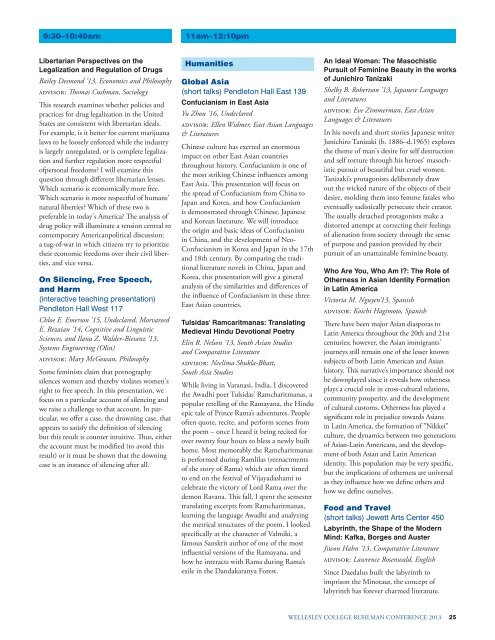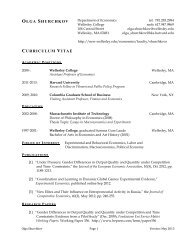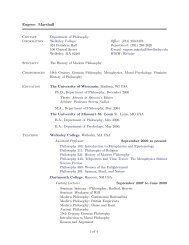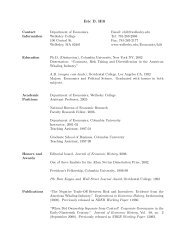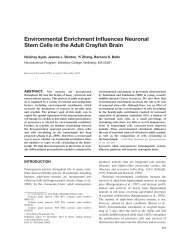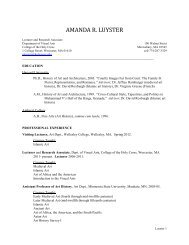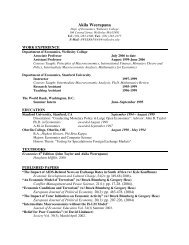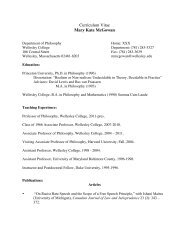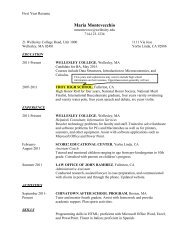Complete Conference Program - Wellesley College
Complete Conference Program - Wellesley College
Complete Conference Program - Wellesley College
You also want an ePaper? Increase the reach of your titles
YUMPU automatically turns print PDFs into web optimized ePapers that Google loves.
9:30–10:40am 11am–12:10pm<br />
libertarian Perspectives on the<br />
legalization and Regulation of Drugs<br />
Bailey Desmond ’13, Economics and Philosophy<br />
AdvisoR: Thomas Cushman, Sociology<br />
This research examines whether policies and<br />
practices for drug legalization in the United<br />
States are consistent with libertarian ideals.<br />
For example, is it better for current marijuana<br />
laws to be loosely enforced while the industry<br />
is largely unregulated, or is complete legalization<br />
and further regulation more respectful<br />
ofpersonal freedoms? I will examine this<br />
question through different libertarian lenses.<br />
Which scenario is economically more free.<br />
Which scenario is more respectful of humans'<br />
natural liberties? Which of these two is<br />
preferable in today's America? The analysis of<br />
drug policy will illuminate a tension central to<br />
contemporary Americanpolitical discussion:<br />
a tug-of-war in which citizens try to prioritize<br />
their economic freedoms over their civil liberties,<br />
and vice versa.<br />
On Silencing, Free Speech,<br />
and Harm<br />
(interactive teaching presentation)<br />
Pendleton Hall West 117<br />
Chloe E. Emerson ’15, Undeclared, Morvareed<br />
E. Rezaian ’14, Cognitive and Linguistic<br />
Sciences, and Ilana Z. Walder-Biesanz ’13,<br />
Systems Engineering (Olin)<br />
AdvisoR: Mary McGowan, Philosophy<br />
Some feminists claim that pornography<br />
silences women and thereby violates women's<br />
right to free speech. In this presentation, we<br />
focus on a particular account of silencing and<br />
we raise a challenge to that account. In particular,<br />
we offer a case, the drowning case, that<br />
appears to satisfy the definition of silencing<br />
but this result is counter intuitive. Thus, either<br />
the account must be modified (to avoid this<br />
result) or it must be shown that the downing<br />
case is an instance of silencing after all.<br />
Humanities<br />
Global Asia<br />
(short talks) Pendleton Hall East 139<br />
Confucianism in east Asia<br />
Yu Zhou ’16, Undeclared<br />
AdvisoR: Ellen Widmer, East Asian Languages<br />
& Literatures<br />
Chinese culture has exerted an enormous<br />
impact on other East Asian countries<br />
throughout history. Confucianism is one of<br />
the most striking Chinese influences among<br />
East Asia. This presentation will focus on<br />
the spread of Confucianism from China to<br />
Japan and Korea, and how Confucianism<br />
is demonstrated through Chinese, Japanese<br />
and Korean literature. We will introduce<br />
the origin and basic ideas of Confucianism<br />
in China, and the development of Neo-<br />
Confucianism in Korea and Japan in the 17th<br />
and 18th century. By comparing the traditional<br />
literature novels in China, Japan and<br />
Korea, this presentation will give a general<br />
analysis of the similarities and differences of<br />
the influence of Confucianism in these three<br />
East Asian countries.<br />
Tulsidas' Ramcaritmanas: Translating<br />
medieval Hindu Devotional Poetry<br />
Elin R. Nelson ’13, South Asian Studies<br />
and Comparative Literature<br />
AdvisoR: Neelima Shukla-Bhatt,<br />
South Asia Studies<br />
While living in Varanasi, India, I discovered<br />
the Awadhi poet Tulsidas’ Ramcharitmanas, a<br />
popular retelling of the Ramayana, the Hindu<br />
epic tale of Prince Rama’s adventures. People<br />
often quote, recite, and perform scenes from<br />
the poem – once I heard it being recited for<br />
over twenty four hours to bless a newly built<br />
home. Most memorably the Ramcharitmanas<br />
is performed during Ramlilas (reenactments<br />
of the story of Rama) which are often timed<br />
to end on the festival of Vijayadashami to<br />
celebrate the victory of Lord Rama over the<br />
demon Ravana. This fall, I spent the semester<br />
translating excerpts from Ramcharitmanas,<br />
learning the language Awadhi and analyzing<br />
the metrical structures of the poem. I looked<br />
specifically at the character of Valmiki, a<br />
famous Sanskrit author of one of the most<br />
influential versions of the Ramayana, and<br />
how he interacts with Rama during Rama’s<br />
exile in the Dandakaranya Forest.<br />
An Ideal Woman: The masochistic<br />
Pursuit of feminine Beauty in the works<br />
of Junichiro Tanizaki<br />
Shelby B. Robertson ’13, Japanese Languages<br />
and Literatures<br />
AdvisoR: Eve Zimmerman, East Asian<br />
Languages & Literatures<br />
In his novels and short stories Japanese writer<br />
Junichiro Tanizaki (b. 1886–d.1965) explores<br />
the theme of man's desire for self destruction<br />
and self torture through his heroes' masochistic<br />
pursuit of beautiful but cruel women.<br />
Tanizaki’s protagonists deliberately draw<br />
out the wicked nature of the objects of their<br />
desire, molding them into femme fatales who<br />
eventually sadistically persecute their creator.<br />
The usually detached protagonists make a<br />
distorted attempt at correcting their feelings<br />
of alienation from society through the sense<br />
of purpose and passion provided by their<br />
pursuit of an unattainable feminine beauty.<br />
Who Are You, Who Am I?: The Role of<br />
otherness in Asian Identity formation<br />
in latin America<br />
Victoria M. Nguyen’13, Spanish<br />
AdvisoR: Koichi Hagimoto, Spanish<br />
There have been major Asian diasporas to<br />
Latin America throughout the 20th and 21st<br />
centuries; however, the Asian immigrants'<br />
journeys still remain one of the lesser known<br />
subjects of both Latin American and Asian<br />
history. This narrative’s importance should not<br />
be downplayed since it reveals how otherness<br />
plays a crucial role in cross-cultural relations,<br />
community prosperity, and the development<br />
of cultural customs. Otherness has played a<br />
significant role in prejudice towards Asians<br />
in Latin America, the formation of "Nikkei"<br />
culture, the dynamics between two generations<br />
of Asian-Latin Americans, and the development<br />
of both Asian and Latin American<br />
identity. This population may be very specific,<br />
but the implications of otherness are universal<br />
as they influence how we define others and<br />
how we define ourselves.<br />
Food and Travel<br />
(short talks) Jewett Arts Center 450<br />
labyrinth, the Shape of the modern<br />
mind: Kafka, Borges and Auster<br />
Jiwon Hahn ’13, Comparative Literature<br />
AdvisoR: Lawrence Rosenwald, English<br />
Since Daedalus built the labyrinth to<br />
imprison the Minotaur, the concept of<br />
labyrinth has forever charmed literature.<br />
WELLESLEY COLLEGE RUHLMAN CONFERENCE 2013 25


